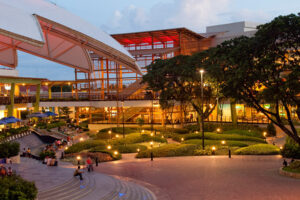E-commerce seen altering tenancy mix in PHL malls

THE RISE of e-commerce platforms is continuously transforming the retail landscape in the Philippines, altering the tenancy mix in malls, a real estate agency said.
“The online shopping movement has caused ripples in the retail market as brick-and-mortar stores adjust to smaller leasable areas,” Lean D. Cacatian, manager for consultancy at KMC Savills, said in an e-mailed reply to questions on Oct. 10.
Mr. Cacatian said this has been more apparent in apparel stores since more people are shifting toward buying their clothes and accessories online.
KMC said retail developments are using strategies like double-digit monthly sales (e.g., 1.1, 2.2, 3.3) and bank partnerships for discounts to boost foot traffic. It also noted transit-oriented developments to enhance community involvement and mall access.
Christopher A. Argamino, assistant manager for consultancy at KMC Savills, said the retail landscape has greatly improved since the pandemic.
He said key players are capitalizing on the growth opportunity by expanding their presence across all areas around the country.
“Leading mall developers (i.e., Ayala Malls and SM Retail) are maximizing their potential returns as they continue to renovate existing malls to accommodate prospective tenants,” he said.
Mall operator Ayala Malls has allocated P13 billion for the redevelopment of four of its malls: Glorietta, Greenbelt 2, TriNoma, and Ayala Center Cebu.
Expected changes include exterior and interior design improvements, lush greeneries and open space, as well as enhanced areas for convergence and retail spaces.
“In the past several years, much has changed for all of us — both during and before the pandemic. We’ve seen habits changes, preferences evolve, and priorities reset. With this, we feel it is an opportunity to usher in a new era for Ayala Malls — and a new experience for our customers,” Ayala Malls President Mariana Beatriz Zobel de Ayala said in a briefing in February.
Mr. Argamino said international brands that were not previously in the retail landscape — such as Love Bonito and Nitori — are leading tenant movements in local malls and expect the trend to continue.
This trend is due to the rising income levels of the population, making it profitable for more upscale brands to enter the country.
The average annual income of Filipino families increased by 15% to P353,230 in 2023 from P307,190 in 2021, as wages and quality of jobs improved, the Philippine Statistics Authority’s recent family income and expenditure survey data showed.
Overall, the retail scene may see more upscale brands entering as the country’s purchasing power improves, KMC Savills said.
Mr. Argamino also noted that tenants that encourage visitors to spend more time in malls have also seen an increase in popularity, particularly sports simulator rooms, children’s activity centers, and dance studios, aside from the typical cinemas and arcades.
He also noted that government satellite offices and various churches are occupying mall spaces. — Aubrey Rose A. Inosante




